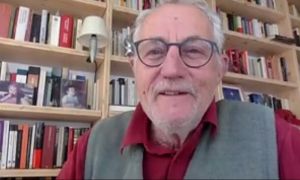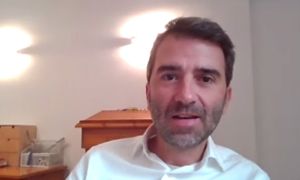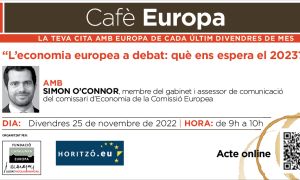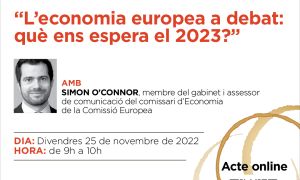On Friday, November 25, a new online debate of the Café Europa cycle was organized by the Catalunya Europa Foundation and the Horitzó Europa association on the last Friday of each month. The session, the last of this year, was dedicated to the economic prospects for 2023 in Europe, Spain and Catalonia.
Economic forecasts predict an uncertain and complicated scenario for Europe for 2023. Factors such as the war in Ukraine, the gas market and potential supply problems, rising inflation, high interest rates and weak growth prospects are among the threats to the continent’s immediate future, and that will undoubtedly also take its toll on the Spanish economy.
Against this background, which is not encouraging, Simon O'Connor, Member of the Cabinet and Communication Adviser to the European Commissioner for Economic and Monetary Affairs of the European Commission, Paolo Gentiloni, and Jordi Angusto, took part in this session of Café Europa, economist and former economic adviser to the European Parliament who outlined their views on the subject.
While admitting that inflation growth has been stronger and more sustained than previously thought, O'Connor predicted a containment of price increases by 2023, which will also help contain the state deficit. Considers also that the energy tensions which Europe is experiencing as a result of the Russian war will lead to a reduction in dependence on gasification and a commitment to other energies which will have a positive impact in 2023; 2024 and beyond.
For his part, Jordi Angusto, was more skeptical about the situation and exposed the perplexity of experts about a labor market that resists -fortunately- in an economy that is getting colder. The former European adviser was also critical of a European policy which uses the rise in the price of money as an anti-inflationary measure in the face of inflation which is not the product of increased demand and which can therefore only cause in his opinion, an aggravation of the stagnation of the economy.
The economist took the opportunity to ask a question, almost philosophical, as to whether it is really feasible to have a single European market made up of countries with inflation ranges so different from each other that they have macro-imbalances between the Member States. O'Connor’s imbalances are largely the product of the different ways in which the European economies are being affected by the rise in the price of energy as a result of their dependence on external sources and the various energy structures energetic.
Finally, both experts wanted to highlight the legislative changes approved by the Commission in relation to taxes on multinationals, which should lead to increased collection and, investment capacity to approve new economic policy instruments which may be financed from this revenue.
The session, which generated many questions from the public, was moderated by the director of the Catalunya Europa Foundation, Pau Mas, and by the president of the association Horitzó Europa, Albert Royo.
The Café Europa cycle will resume its activity on Friday 27 January 2023.













